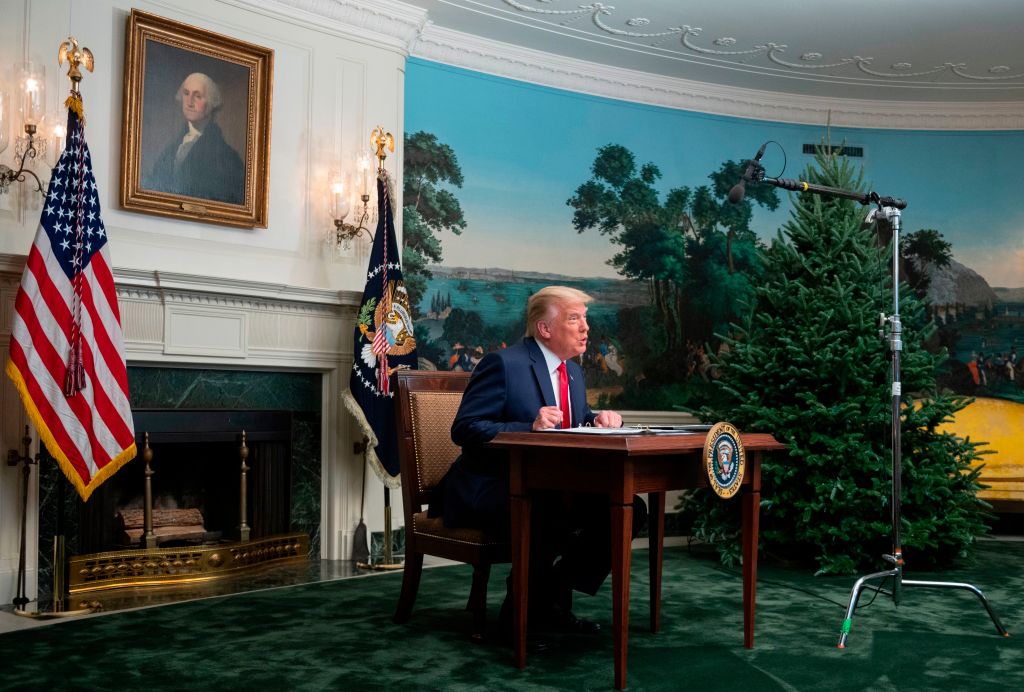Congress, with bipartisan flashes of irritation, shrugs off Trump's defense bill veto threat


A free daily email with the biggest news stories of the day – and the best features from TheWeek.com
You are now subscribed
Your newsletter sign-up was successful
White House Press Secretary Kayleigh McEnany said Wednesday that President Trump was "serious" about vetoing the $740 billion National Defense Authorization Act if Congress doesn't include a repeal of Section 230 of the 1996 Communications Decency Act, an unrelated measure that gives internet sites broad legal liability for content users post. "He is going to put the pressure on Congress to step up on this," she said. Congress indicated it wouldn't be pressured.
The popular legislation sets military policy for the year and includes measures like a pay raise for U.S. service members. It's one of two things Congress is intent on passing before adjourning for the year.
"230 has nothing to do with the military," Senate Armed Services Committee Chairman James Inhofe (R-Okla.) said. "I agree with his sentiments, we ought to do away with 230 — but you can't do it in this bill." In a joint statement, House Armed Services Committee Chairman Adam Smith (D-Wash.) and the committee's top Republican, Rep. Mac Thornberry (Texas), said they "have toiled through almost 2,200 provisions to reach compromise" on this bill, and "the time has come" to pass it, as Congress and the White House have done "for 59 straight years."
The Week
Escape your echo chamber. Get the facts behind the news, plus analysis from multiple perspectives.

Sign up for The Week's Free Newsletters
From our morning news briefing to a weekly Good News Newsletter, get the best of The Week delivered directly to your inbox.
From our morning news briefing to a weekly Good News Newsletter, get the best of The Week delivered directly to your inbox.
Those were the polite responses. Rep. Adam Kinzinger (R-Ill.) told Trump via Twitter he would vote to override a veto "because it’s really not about you." Senate Minority Leader Chuck Schumer (D-N.Y.) said Trump "seems intent on filling each of his remaining days in office with petulance, grievance, self-interest." One GOP lawmaker told Politico, "Republicans are sick of this sh-t."
The House and Senate passed their separate versions of the NDAA with veto-proof majorities over the summer, and the final bicameral compromise was being passed around Capitol Hill on Wednesday. House Speaker Nancy Pelosi (D-Calif.) is reportedly ready to bring it to the floor. Senate Majority Leader Mitch McConnell (R-Ky.), who typically freezes legislation if Trump threatens a veto, has not commented publicly.
There is bipartisan interest in at least amending Section 230, but only a few lawmakers — including Sens. Lindsey Graham (R-S.C.) and Josh Hawley (R-Mo.) — backed Trump's lame-duck effort to "terminate" it via the NDAA. Congress already ignored Trump's first veto threat over this bill — the final version includes bipartisan language telling the Pentagon to rename 10 military bases named after Confederate generals. If Trump follows through with his veto threat over Section 230, it could prompt the first veto override of his presidency.
A free daily email with the biggest news stories of the day – and the best features from TheWeek.com
Peter has worked as a news and culture writer and editor at The Week since the site's launch in 2008. He covers politics, world affairs, religion and cultural currents. His journalism career began as a copy editor at a financial newswire and has included editorial positions at The New York Times Magazine, Facts on File, and Oregon State University.
-
 The environmental cost of GLP-1s
The environmental cost of GLP-1sThe explainer Producing the drugs is a dirty process
-
 Greenland’s capital becomes ground zero for the country’s diplomatic straits
Greenland’s capital becomes ground zero for the country’s diplomatic straitsIN THE SPOTLIGHT A flurry of new consular activity in Nuuk shows how important Greenland has become to Europeans’ anxiety about American imperialism
-
 ‘This is something that happens all too often’
‘This is something that happens all too often’Instant Opinion Opinion, comment and editorials of the day
-
 ‘One Battle After Another’ wins Critics Choice honors
‘One Battle After Another’ wins Critics Choice honorsSpeed Read Paul Thomas Anderson’s latest film, which stars Leonardo DiCaprio, won best picture at the 31st Critics Choice Awards
-
 Son arrested over killing of Rob and Michele Reiner
Son arrested over killing of Rob and Michele ReinerSpeed Read Nick, the 32-year-old son of Hollywood director Rob Reiner, has been booked for the murder of his parents
-
 Rob Reiner, wife dead in ‘apparent homicide’
Rob Reiner, wife dead in ‘apparent homicide’speed read The Reiners, found in their Los Angeles home, ‘had injuries consistent with being stabbed’
-
 Hungary’s Krasznahorkai wins Nobel for literature
Hungary’s Krasznahorkai wins Nobel for literatureSpeed Read László Krasznahorkai is the author of acclaimed novels like ‘The Melancholy of Resistance’ and ‘Satantango’
-
 Primatologist Jane Goodall dies at 91
Primatologist Jane Goodall dies at 91Speed Read She rose to fame following her groundbreaking field research with chimpanzees
-
 Florida erases rainbow crosswalk at Pulse nightclub
Florida erases rainbow crosswalk at Pulse nightclubSpeed Read The colorful crosswalk was outside the former LGBTQ nightclub where 49 people were killed in a 2016 shooting
-
 Trump says Smithsonian too focused on slavery's ills
Trump says Smithsonian too focused on slavery's illsSpeed Read The president would prefer the museum to highlight 'success,' 'brightness' and 'the future'
-
 Trump to host Kennedy Honors for Kiss, Stallone
Trump to host Kennedy Honors for Kiss, StalloneSpeed Read Actor Sylvester Stallone and the glam-rock band Kiss were among those named as this year's inductees
